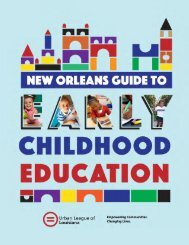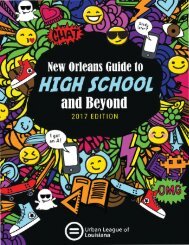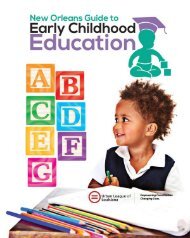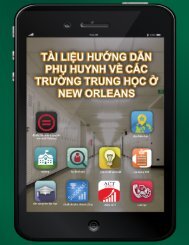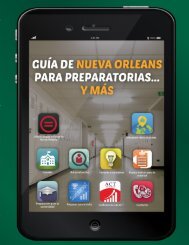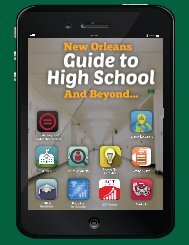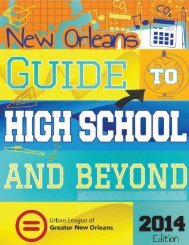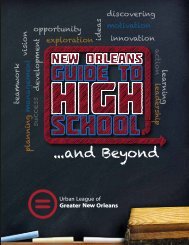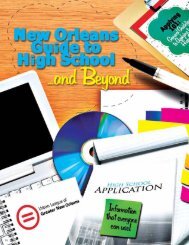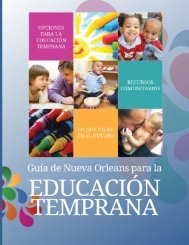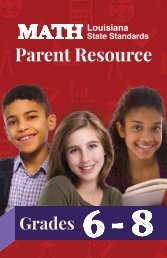New Orleans Guide to High School and Beyond 2018
Create successful ePaper yourself
Turn your PDF publications into a flip-book with our unique Google optimized e-Paper software.
INDIVIDUAL EDUCATION PLANS AND SUPPORTS<br />
<strong>High</strong> <strong>School</strong><br />
The IEP Team, which includes the student <strong>and</strong> school district<br />
develops Individual Education Plans (IEPs) <strong>and</strong> must follow<br />
this legal document in the provision of educational services.<br />
Accommodations <strong>and</strong> or modifications of classes <strong>and</strong><br />
materials are required. The school, with student <strong>and</strong> family<br />
input, is responsible for arranging for accommodations <strong>and</strong><br />
modifications.<br />
College<br />
There are no IEPs in college. The Disability Services Office will<br />
develop an accommodation plan based on documentation of<br />
disability that is provided by the student. Modifications are<br />
not required- only accommodations. Student must request<br />
accommodations from the college Disability Services Office.<br />
Impact On Students With Disabilities<br />
Students with disabilities may have had course accommodations <strong>and</strong> or modifications in their IEPs. In college courses taken for<br />
credit, modifications are not allowed. Some colleges work with faculty or a facilita<strong>to</strong>r <strong>to</strong> identify course modifications or <strong>to</strong> create<br />
an individualized set of expectations for the course. In these cases, students would not receive a college credit. Accommodations<br />
are provided <strong>to</strong> students with disabilities, typically through the Disability Services Office. While it is expected that college students<br />
meet with the DSO <strong>to</strong> arrange for these accommodations themselves, there may be some support <strong>to</strong> help students with intellectual<br />
disabilities become familiar with these services or there might be a separate or additional service coordina<strong>to</strong>r or coach <strong>to</strong> guide/<br />
men<strong>to</strong>r the student. Some students might still have an IEP, if they are participating in college classes while still in high school. An IEP<br />
or Section 504 plan does not follow a student from high school <strong>to</strong> college (This remains the responsibility of the IEP/504 teams.).<br />
However, colleges are prohibited from discriminating against students with disabilities, <strong>and</strong> must work with students <strong>to</strong> ensure their<br />
disability needs are met in the classroom <strong>and</strong> in student housing.<br />
DEFINITIONS<br />
Postsecondary Education - beyond the high school level (i.e.,<br />
community college, four-year University, vocational training program).<br />
Section 504 of the Rehabilitation Act - Federal law<br />
guaranteeing students with disabilities “reasonable accommodations”<br />
in higher education unless those accommodations would constitute an<br />
“undue burden”.<br />
Individual with a Disability - is defined by the ADA as a person<br />
who has a physical or mental impairment that substantially limits one<br />
or more major life activities, a person who has a his<strong>to</strong>ry or record of<br />
such an impairment, or a person who is perceived by others as having<br />
such an impairment.<br />
Intellectual Disability (ID) - Intellectual disability is a disability<br />
characterized by significant limitations both in intellectual functioning<br />
<strong>and</strong> in adaptive behavior as expressed in conceptual, social, <strong>and</strong><br />
practical adaptive skills. This disability originates before the age of 18.<br />
Entitlement - A legal right, typically used in the context of Ch.766<br />
where children are entitled <strong>to</strong> services written in the IEP that are<br />
provided <strong>and</strong>/or moni<strong>to</strong>red by the school system, or in the context of<br />
Ch.688 where a person is entitled <strong>to</strong> a plan, but receiving services is<br />
not an entitlement (i.e. services are not guaranteed).<br />
Facilita<strong>to</strong>r - A person who leads <strong>and</strong> chairs meetings <strong>to</strong> address<br />
various <strong>to</strong>pics including person centered planning meetings, resource<br />
mapping, etc.<br />
Content provided with consent of the University of Massachusetts Bos<strong>to</strong>n.<br />
Think College - College Options for People with Intellectual<br />
Disabilities (http://www.thinkcollege.net)<br />
©2015, University of Massachusetts Bos<strong>to</strong>n. Think College is a project of the Institute<br />
for Community Inclusion at the University of Massachusetts Bos<strong>to</strong>n. The Think<br />
College initiatives are funded by grants from the National Institute on Disability<br />
<strong>and</strong> Rehabilitation Research, the Administration on Developmental Disabilities, the<br />
Office of Special Education Programs, <strong>and</strong> the Office of Postsecondary Education.<br />
The contents of this website do not necessarily reflect an official position of the<br />
sponsoring agencies.<br />
24



